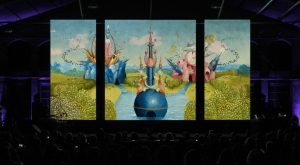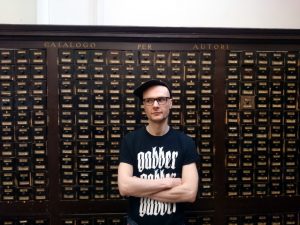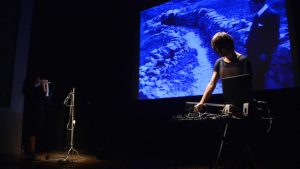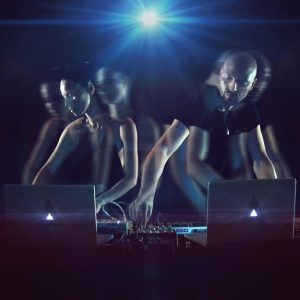Ibrida, International Festival of Intermediate Arts returns to Forlì from 24 to 26 September 2021 with a (post) pandemic edition that translates into cultural and artistic proposals – between video art, performance art and electronic music – the digital acceleration that we have all experienced over the past months. After the multifunctional center Fabbrica delle Candele, the main venue of the festival since 2015, and the San Domenico Arena, an evocative institutional location chosen in 2020, this year the exhibition will take place in the spaces of EXATR, a hub devoted to contemporary art located in the historic center of Forlì.
The heart of the project is always a reflection, updated every year, on the potential of experimental audiovisual and its ability to renew itself in contamination with other disciplines and the format also remains unchanged, which provides for the alternation of live shows, projections, talks and installations both in presence and in streaming through the official website.
To get some previews of the planned initiatives, we interviewed Francesca Leoni and Davide Mastrangelo, creators and artistic directors of the event organized by the cultural association Vertov Project with the contribution of various national and international critics and artists.
Emanuela Zanon: For some years now, the spoilers on Ibrida a few weeks before the beginning of the festival have become a regular appointment for Juliet’s readers: would you like to tell us what new features will characterize the 2021 edition?
Francesca Leoni and Davide Mastrangelo: We return to our original formula with more live shows, meetings and workshops in presence. The Festival has already started with a preview in June: a completely new video selection curated by Cosimo Terlizzi, entitled Vertigine and which involves nineteen students from academies and universities from all over Italy, who work in a critical and artistic way with smartphone and portrait format. A video selection available only on the Festival’s Instagram channel (@ibridafestival). We will also have the presence of several guests, such as the video artist Kika Nicolela, Rino Stefano Tagliafierro of Karmachina, Apotropia, Francesca Fini, Riccardo Balli, Francesca Lolli, Luca Maria Baldini, Fiorenza Menni, Cosimo Terlizzi and many others.
What problems did you face in organizing another courageous edition in pandemic times?
The biggest difficulty was finding the necessary energy to not be discouraged after the adversities of the last year. By now tired of the notorious suspended time that has been so much discussed, we believe the time has come to design, taking into account the epochal change that we are all facing. It will be increasingly difficult to carry out projects in a univocal way and without taking into consideration the changing and hybrid reality that surrounds us. By our nature we have always embraced hybridization as a distinctive trait, adapting to the present and not excluding any type of language. We want to be a mirror of what happens in our society, a bridge between the physical and digital world. The boundaries are very unstable and fragile, it is necessary to bring out and develop a new (digital) critical thinking, also because a real unprecedented intermediate acceleration is taking place. We must also say thanks to the municipal and regional administration (Municipality of Forlì – Emilia-Romagna Region), who have never abandoned us, renewing their contributions and interest in our reality.
The schedule of projections features video art works from over thirty countries, partly selected through an open call to which hundreds of artists from all over the globe responded. In your opinion, what interpretations / metabolisations of the particular epochal and global conjuncture we are experiencing have emerged in these works?
We have received more than six hundred audiovisual works, from all over the globe, of which we have selected, after a second screening, forty-five videos. The resulting screening is multifaceted, the substantial differences are manifold. In all the works there is an awareness of the epochal change we are experiencing, developed in several themes and styles ranging from climate change, to gender equality, up to the simple manipulation of digital signals as a political act. The only common denominator is the video medium in its many nuances and hybridizations. The new artistic productions from abroad are mostly parodies and collective psychoses of a system that can no longer be done without. Italian artists always maintain a certain rigor in form and content: although there is an intermediate acceleration on several fronts, we Italians are unable to completely abandon the “classic” for the new. This, after all, is neither good nor bad, but only a photograph of our artistic action. The few post internet artists present on the national territory, in fact, are the exception that confirm the rule.
Also this year you have chosen to enhance the live dimension, in my opinion an essential component of the identity of Ibrida that allows you to “verify in the field” the concept of hybridization which is the main subject of investigation of the festival. Could you tell us who the invited artists are and how they related to the new location?
The live component of Ibrida has always been the cornerstone of the three evenings, because it allows us to bring our essence into play. Since last year we have moved to EXATR, a former rationalist courier depot redeveloped as a container of the contemporary, with the meetings open to the public, while this year we will move to those spaces with the whole Festival. We chose EXATR because it is a creative hub that connects different contemporary realities of Forlì, a place of social innovation suited to our peculiarities. We will open with a national preview: Tríptiko. A vision inspired by Hieronymus Bosch, live conceived and created by the Karmachina studio, animations by Rino Stefano Tagliafierro, in collaboration with the musical trio Fernweh. A hybrid live par excellence in which the images of Bosch’s works are digitally reworked in an all-encompassing audiovisual journey, where more figurative moments will alternate with others more abstract, which freely evoke the visionary and lysergic nature of the Flemish master’s work. The live was presented only in Spain on the occasion of the Premios Princesa De Asturias 2019, the images of the works of the great painter will be used by direct courtesy of the Museo Nacional del Prado in Madrid. In the late evening we will change course and continue with Dj Balli who will propose Sbrang Gabba Gang, an accelerationist live that projects us from futurism to Dutch gabber culture. A visual bombardment of support for music, in a real Gabber-Futurist reconstruction of the Universe. On Saturday 25th we will have the video artists and performers Apotropia with Altered Ego, followed by MUVIC with Olympia, live soundtrack of the homonymous feature film by Leni Riefenstahl, an interaction between music and film in which audio re-sampling and image manipulation follow a new sound and visual structure. We will close with You will see nothing of me in this film by Cosimo Terlizzi, Fiorenza Menni and Luca Maria Baldini, a hybrid of cinema, theater and electronic music not to be missed.
You have always given great importance to the active involvement of media representatives and the theoretical contribution of scholars in the sector, such as the critic Piero Deggiovanni who will curate the monographic sections dedicated to the work of Francesca Lolli and Elisa Giardina Papa. Compared to the goal of bringing video art out of the limbo of underground festivals and the dispersion of the internet, do you think something is moving?
Many are beginning to find interest in video art in a transversal way. We live in an era of transition, where only the hybridization of genres and languages finds the right dimension. This year we have entered into several partnerships with both critics and similar realities such as the Pepinieres Europeenes de Creation (Paris), the RoBOt Festival (Bologna), The Next Generation Short Film Festival (Bari) and finally the Forlì. Soglie committee, composed of seven cultural and artistic groups of the city of Forlì that have a direct relationship with contemporaneity and its articulations, investigating the present through different disciplines but, in intentions, dialoguing. We remind you that the use of single-channel video art works is no longer linked to galleries, museums or foundations, which tend to reaffirm what is already recognized by the market and large institutions, but to festivals. Our purpose remains the same: total openness to new audiovisual influences, even the most disparate and that may not survive the following year… But our purpose is not to historicize the phenomena, that will be what critics, museums and institutions will think. Ibrida Festival maps an important cross-section of the intermediate arts and creates physical and digital connections, becoming a necessary bridge of exchange. Every year we see the birth of new projects within the Festival that artists, critics and curators carry out beyond the borders of Ibrida, and this fills us with joy and pride. We do not limit ourselves to giving a simple space / showcase to the works, but we also promote them beyond the programming of our Festival, as happened for the 52 vids X Ibrida project, created in collaboration with Exibart: we have selected fifty-two Italian artists, presenting one artist a week over a whole calendar year, on Exibart TV channels. In the future there will be other extra Festival projects, both in the physical and digital world, aimed at promoting intermediate arts and artists.
Info:
 Francesca Leoni and Davide Mastrangelo at EXATR ph. Consuelo Canducci courtesy Vertov Project
Francesca Leoni and Davide Mastrangelo at EXATR ph. Consuelo Canducci courtesy Vertov Project
 Tríptiko. A vision inspired by Hieronymus Bosch – KARMACHINA – courtesy Fundación Princesa de Asturias e Museo Nacional del Prado di Madrid
Tríptiko. A vision inspired by Hieronymus Bosch – KARMACHINA – courtesy Fundación Princesa de Asturias e Museo Nacional del Prado di Madrid
 Tríptiko. A vision inspired by Hieronymus Bosch – KARMACHINA – courtesy Fundación Princesa de Asturias e Museo Nacional del Prado di Madrid
Tríptiko. A vision inspired by Hieronymus Bosch – KARMACHINA – courtesy Fundación Princesa de Asturias e Museo Nacional del Prado di Madrid
 Karmachina team, ph. courtesy Karmachina
Karmachina team, ph. courtesy Karmachina
 DJ Balli, ph. courtesy Riccardo Balli
DJ Balli, ph. courtesy Riccardo Balli
 Luca Maria Baldini, Fiorenza Menni and Cosimo Terlizzi, Non troverete nulla di me in questo film, 2021, ph. courtesy the artists
Luca Maria Baldini, Fiorenza Menni and Cosimo Terlizzi, Non troverete nulla di me in questo film, 2021, ph. courtesy the artists
 Apotropia, Altered Ego, 2020, ph. courtesy Apotropia
Apotropia, Altered Ego, 2020, ph. courtesy Apotropia
 Francesca Leoni, Davide Mastrangelo and Ibrida staff at EXATR ph. Consuelo Canducci courtesy Vertov Project
Francesca Leoni, Davide Mastrangelo and Ibrida staff at EXATR ph. Consuelo Canducci courtesy Vertov Project
Graduated in art history at DAMS in Bologna, city where she continued to live and work, she specialized in Siena with Enrico Crispolti. Curious and attentive to the becoming of the contemporary, she believes in the power of art to make life more interesting and she loves to explore its latest trends through dialogue with artists, curators and gallery owners. She considers writing a form of reasoning and analysis that reconstructs the connection between the artist’s creative path and the surrounding context.






NO COMMENT